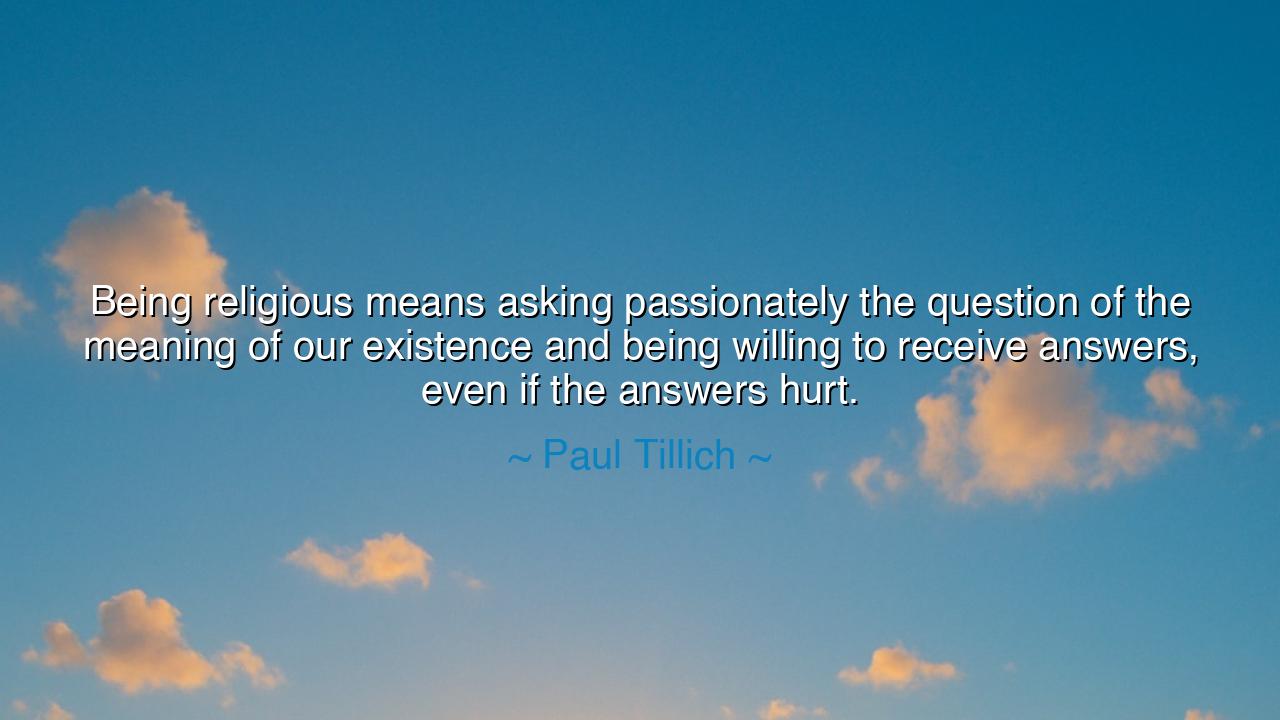
Being religious means asking passionately the question of the
Being religious means asking passionately the question of the meaning of our existence and being willing to receive answers, even if the answers hurt.






“Being religious means asking passionately the question of the meaning of our existence and being willing to receive answers, even if the answers hurt.” Thus spoke Paul Tillich, the philosopher-theologian who stood at the meeting place between faith and reason, between man’s yearning and God’s silence. In this sentence, Tillich tears away the veil of complacent religion and reveals its beating heart—not ritual, not doctrine, but the passionate search for meaning. To be truly religious, he declares, is not to possess answers, but to ask, to seek with one’s whole soul, to wrestle with existence as Jacob wrestled with the angel of God. It is a struggle born not of pride, but of love—a desire to understand why we are, who we are, and what the mystery of being demands of us.
Tillich’s words awaken us to a forgotten truth: that faith is not certainty, but courage. The man who never questions may appear faithful, but his belief is hollow. True religion, Tillich reminds us, begins when the soul dares to stand before the vastness of life and cry out, “Why?” To ask this question is to open oneself to both light and pain. For truth, when it arrives, does not always comfort—it sometimes burns. To be willing to receive answers, even if the answers hurt, is to walk the narrow path of spiritual honesty. It is to acknowledge that understanding may demand the surrender of illusion, that growth may require the breaking of pride, and that revelation may pierce as deeply as it heals.
The origin of this quote lies in Tillich’s lifelong quest to reconcile human existence with divine mystery. Born in Germany, he lived through the chaos of the First World War and the rise of totalitarianism. He saw how religion, when reduced to dogma, could lose its soul—how men could shout the name of God even as they committed acts of evil. Out of that darkness came his conviction: that religion must be a living dialogue between man and the infinite. It must confront the real—our despair, our longing, our loneliness—and not hide behind shallow piety. To be religious, in Tillich’s vision, is to stand naked before existence, asking it to speak truth, no matter the cost.
Consider the story of Søren Kierkegaard, the Danish philosopher who walked the path of anguish in search of faith. He did not inherit religion as a comfort; he fought for it in solitude. His heart was torn between doubt and belief, between love and loss. Yet it was through that suffering that he discovered what Tillich would later affirm: that faith begins where reason ends, in the passionate act of asking. Kierkegaard’s prayers were not quiet—they were cries of a man who longed to find meaning in a world that offered none. And though the answers he received were often painful, they purified his heart, transforming his despair into devotion.
Tillich’s insight also speaks to our modern age, where the noise of comfort often drowns the voice of truth. Many seek religion as escape—as a refuge from doubt, from grief, from the aching questions of the soul. But this, Tillich warns, is not being religious—it is avoiding the call of the spirit. True religion does not protect us from the questions of existence; it compels us to face them. It demands that we look at the suffering of the world, the brevity of life, and the limits of reason, and still dare to seek meaning. It tells us that the holy is not found by closing one’s eyes, but by opening them—fully, painfully, courageously—to reality.
The lesson of Tillich’s teaching is both simple and profound: do not fear the questions that shake your soul. For it is in questioning that faith is born, and in wrestling with truth that wisdom grows. When life wounds you, do not flee to easy answers; listen instead to what the wound is trying to reveal. When the world seems senseless, dare to ask what sense your love, your suffering, and your struggle might hold in the great design. Faith that cannot endure questioning is not faith—it is comfort dressed as conviction. But faith that endures the fire of doubt emerges not weaker, but truer, its strength refined like gold in flame.
So, my child of restless heart, remember these words of Paul Tillich: “Being religious means asking passionately the question of the meaning of our existence and being willing to receive answers, even if the answers hurt.” Let your faith be alive, not stagnant; questioning, not complacent. Ask deeply, love fiercely, seek tirelessly. For the divine does not dwell in easy certainties, but in the trembling courage of those who ask, and ask again. When the answers come—whether in joy or in sorrow—receive them with humility, for they are the whisper of truth shaping your soul. In that sacred exchange between your longing and the universe’s silence, you will find what Tillich found: that the question itself is holy, and that to ask it with all your heart is already to be in the presence of God.






AAdministratorAdministrator
Welcome, honored guests. Please leave a comment, we will respond soon